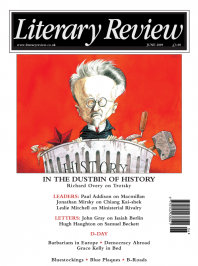Jonathan Mirsky
Reluctant Dictator
The Generalissimo: Chiang Kai-shek and the Struggle for Modern China
By Jay Taylor
Harvard University Press 722pp £25.95
Even in the rapidly widening field of modern Chinese history, it is unusual and gratifying to read a book that upsets not only the reader's previous views but even those of the author himself. When I began learning about contemporary China in 1955, Chiang Kai-shek and the survivors of his regime from the civil war with Mao's Communists had been on Taiwan only six years. We learned that Chiang, a stubborn, unimaginative man and a devout, ascetic Christian, was surrounded by corruption. We learned, too, that he had been comprehensively outfoxed by the hugely popular Mao, who was now propelling China to the reforms Chiang had failed to deliver, and it was probably only a matter of time before Taiwan fell to Mao's armies. As Columbia University's Andrew Nathan has said of Chiang, ‘For decades he was a dominating figure in the American imagination of the Far East, in such roles as China's heroic wartime leader and, later, the feckless and corrupt loser in the Chinese civil war.’
Jay Taylor, for many years an American Foreign Service officer specialising in Chinese affairs, met Chiang several times in Taipei in the early 1960s and was surprised by his limp handshake. When he wrote his earlier book, on Chiang's son and successor, Chiang Ching-kuo, he admits: ‘I portrayed

Sign Up to our newsletter
Receive free articles, highlights from the archive, news, details of prizes, and much more.@Lit_Review
Follow Literary Review on Twitter
Twitter Feed
Russia’s recent efforts to destabilise the Baltic states have increased enthusiasm for the EU in these places. With Euroscepticism growing in countries like France and Germany, @owenmatth wonders whether Europe’s salvation will come from its periphery.
Owen Matthews - Sea of Troubles
Owen Matthews: Sea of Troubles - Baltic: The Future of Europe by Oliver Moody
literaryreview.co.uk
Many laptop workers will find Vincenzo Latronico’s PERFECTION sends shivers of uncomfortable recognition down their spine. I wrote about why for @Lit_Review
https://literaryreview.co.uk/hashtag-living
An insightful review by @DanielB89913888 of In Covid’s Wake (Macedo & Lee, @PrincetonUPress).
Paraphrasing: left-leaning authors critique the Covid response using right-wing arguments. A fascinating read.
via @Lit_Review